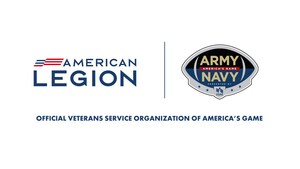The American Legion Greatly Concerned About VA Treatment of PTS With "Useless" Drug - Calls for Congressional Hearings
WASHINGTON, Aug. 8, 2011 /PRNewswire-USNewswire/ -- The head of the nation's largest veterans service organization says he is "greatly concerned" about the widespread use of an apparently ineffective medication by VA (Department of Veterans Affairs) doctors treating patients with post traumatic stress (PTS).
"It is alarming," said Jimmie L. Foster, national commander of The American Legion, "that fully 20 percent of the nearly 87,000 veterans VA physicians treated for PTS last year were given a medication that has proven to be pretty much useless."
According to a study conducted by the Department of Veterans Affairs itself and published recently in the Journal of the American Medical Association (JAMA), Risperdal, an antipsychotic medication commonly prescribed to veterans with post traumatic stress when antidepressants have failed to help, does not alleviate the symptoms of PTS.
"Not only that," said Foster, "but Risperdal is not even approved by the Food and Drug Administration for the treatment of PTS." Only two medications, Zoloft and Paxil, both antidepressants, are government-approved to treat PTS and neither drug, say researchers, is very effective at treating patients with a chronic form of the disorder. "I am greatly concerned that veterans suffering the 'invisible wounds of war' are receiving equally invisible care," said Foster.
The American Legion has been concerned about the misapplication of PTS medications for some time. Last year, the Legion appointed an ad hoc committee to investigate the efficacy of existing treatments for PTS and TBI (traumatic brain injury) and explore alternatives to improve the science. The committee comprises officers of the Legion as well as lay, professional and government consultants. It convened its third meeting during the week of August 1. The JAMA article appeared on August 3.
Among the speakers at the Legion's latest ad hoc committee meeting was Charles Hoge, M.D., who is considered to be one of the country's leading experts on PTS and TBI. From 2002 through 2009, Dr. Hoge, a retired U.S. Army colonel, directed Walter Reed Army Medical Center's research on the psychological and neurological consequences of the Iraq and Afghanistan wars. In light of the JAMA article, Dr. Hoge said he wondered if patients will continue to trust military and veteran medicine's handling of PTS cases. He asked, "Is there a resistance and reluctance among servicemembers and veterans to receive and continue their mental health care?"
Another committee consultant and longtime associate of the Legion is Dr. Jeanne Mager Stellman, Special Lecturer and Professor Emerita of Clinical Health Policy and Management at Columbia University's Mailman School of Public Health. She said, "This is the second major study showing that the drug therapies given to tens of thousands of our nation's veterans for PTS are ineffective and are associated with a range of side effects (such as weight gain). It is time to clean this mess up (and) devote attention to the problem – not wait years for studies to be done, results to be published and still not have changes made."
Commander Foster said he is urging Congress to conduct hearings on the ongoing difficulties being experienced by both the Department of Defense (DoD) and VA in the treatment of PTS as well as TBI. He is also prompting both the DoD and VA to speed up their research on the screening of PTS and TBI cases and the treatment of them. "Accelerated research, however, must be balanced with great care and absolute accuracy," Foster concluded.
SOURCE The American Legion
WANT YOUR COMPANY'S NEWS FEATURED ON PRNEWSWIRE.COM?
Newsrooms &
Influencers
Digital Media
Outlets
Journalists
Opted In






Share this article